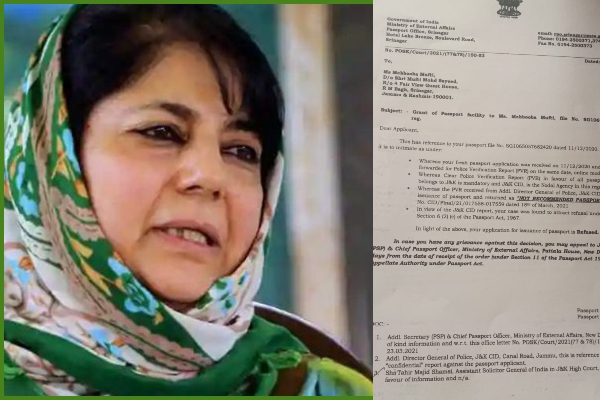'Detrimental to India's security', Mehbooba Mufti says her application for passport rejected
Total Views |
New Delhi, March 29: Former Chief Minister of Jammu and Kashmir Mehbooba Mufti today said on Twitter that she had been denied a passport by the government of India, citing national security. In the tweet, she said, “Passport Office refused to issue my passport based on CID’s report citing it as ‘detrimental to the security of India. This is the level of normalcy achieved in Kashmir since Aug 2019 that an ex-Chief Minister holding a passport is a threat to the sovereignty of a mighty nation.”

In the letter, it was mentioned that the request was denied based on the Police Verification Report (PVR) received from the Additional Director General of Police, Jammu and Kashmir CID. The PVR was returned to the passport office with the remark “Not Recommended Passport Case”.
The passport was denied by the CID under Section 6 (2) (c) of the Passport Act, 1967. Section 6 of the Passport Act deals with the refusal of passport and travel documents. The sub-section (2) clause (c) states that the passport authority shall refuse to make an endorsement for visiting any country if the departure of the applicant from India may, or is likely to, be detrimental to the security of India.
Under Section 11 of the Passport Act, 1967, Mufti can appeal to the Passport Office, Ministry of External Affairs, New Delhi, against the refusal of issuance of passport by the Passport Office, Jammu and Kashmir within 30 days of the receipt of the letter. On March 25, while hearing a petition filed by Mehbooba Mufti in Jammu and Kashmir High Court, the court was informed by the Jammu and Kashmir Police that the issuance of the passport was opposed based on the ‘adverse report’ received from CID. The report submitted in the High Court by the Police stated that Mufti cannot be issued a passport because the CID sees security issues.
As per reports, Mufti had applied for a fresh passport on December 11, 2020. Her previous passport had expired on May 31 last year. Speaking on the issue, Police officials said that an adverse report has been filed against her by the Criminal Investigation Department (CID), but refused to elaborate, saying the matter would be taken up before the high court.
.
.